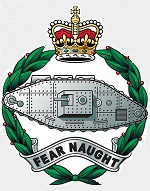Dragon DRR60419 British Churchill Mk. III Infantry Tank with Extended Exhaust Pipes - "Beefy", 14th Canadian Army Tank Regiment (Calgary Regiment), Operation Jubilee, Dieppe, 1942 (1:72 Scale)
"It would be safe to say that many American lives were saved in North Africa because of lessons learned in the dress rehearsal by the commando raid at Dieppe."
- American correspondent Quentin Reynolds eyewitness account as published in Dress Rehearsal: The Story of Dieppe
 The "Churchill" began life as a 1939 requirement that envisaged a return to trench-warfare, and was therefore slow and heavily armored like the Russian KV-1 series. That said, the final Churchill prototype was much lighter than had first been thought acceptable, although it still resembled a World War I tank in appearance. Rushed into production at a time when a cross-channel invasion seemed imminent, it suffered early reliability problems and was not fully introduced until 1943. Early combat experience during the ill-fated Dieppe raid in 1942 was disappointing, but the vehicle proved more mobile in the rough terrain of North Africa. The tank excelled in its specialized variants, which include the AVRE, Crocodile flamethrower tank, bridgelayer and more. In fact, it wasn't until the 1960s that the last Churchill was finally retired.
The "Churchill" began life as a 1939 requirement that envisaged a return to trench-warfare, and was therefore slow and heavily armored like the Russian KV-1 series. That said, the final Churchill prototype was much lighter than had first been thought acceptable, although it still resembled a World War I tank in appearance. Rushed into production at a time when a cross-channel invasion seemed imminent, it suffered early reliability problems and was not fully introduced until 1943. Early combat experience during the ill-fated Dieppe raid in 1942 was disappointing, but the vehicle proved more mobile in the rough terrain of North Africa. The tank excelled in its specialized variants, which include the AVRE, Crocodile flamethrower tank, bridgelayer and more. In fact, it wasn't until the 1960s that the last Churchill was finally retired.
Pictured here is a 1:72 scale replica of a British Churchill Mk. III infantry tank that was involved in the amphibious landing at Dieppe during 1942.
Sold Out!
Dimensions:
Length: 4-inches
Width: 1-1/2-inches
Release Date: March 2015
Historical Account:: "Jubilee" - The Allies Operation Jubilee of August 1942 the Dieppe Raid was clearly a military defeat. Why the Allies launched this raid and the raids objectives, however, have at best remained secondary to this fact in public knowledge. Moreover, a common observation is that Dieppe's operational lessons were directly responsible for the successful Allied invasion of Normandy in June 1944. This conclusion, while accurate, implies that the Dieppe Raid was the only way to learn specific lessons and that the thousands wounded, captured, and killed in 1942 were necessary for future operational successes.
The Allies conceived the raid for several reasons. The Allies wanted to test German defenses in France and gather information useful for a later, larger invasion. A successful, daring raid was also designed to boost the Allies lagging morale at the time. Additionally, Soviet leader Joseph Stalin demanded the opening of a second front in Western Europe to alleviate the Germans pressure on his armies in the east. British, Canadian, and American leaders believed a raid would meet the first two objectives and temporarily pacify Stalin's demands.


